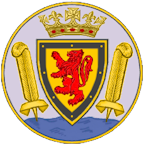Mary Blake and Mary May
Mary Blake was born in Saltash in 1761, and her daughter Mary May was welcomed into the family in 1784. These two hard-working women made a living by selling shellfish and never rose above their humble station in life, but they were well-known and respected locally, especially by the personnel at the Stonehouse Marine Barracks and the Royal Naval Hospital, which they began supplying around the turn of the century.
Written in the parish register at Saltash is an anonymous summary of Mary Blake's career:
"Where Tamar's waters
roll along, O'er muddy banks and rocks,
The ancient Town of Saltash stands, Well known for pickle cocks.
It claims the right to shrimp and dredge, Within the headlands round,
From Shagstone up to Ogle Tor, The Bay and Plymouth Sound.
Throughout the spring and summer months, The shrimp net and the rake
Are used to catch a livelihood. 'Twas so with Mary Blake.
Each morning Mary passed the gate, True as the best of clocks,
The Barrack children knew the cry, "Will 'e buy my pickle cocks?"
So half a century passed and she Cared not for wind or rain,
Blest with the best of health and strength, Her trade she did maintain.
Worn out with years no more she'll stir Mid kettles, pans, and crocks,
No more on Kinterbury's back Rake up the pickle cocks.
– A Cockle Woman; Verses On Mrs Mary Blake, D 1841"
The Plymouth, Devonport and Stonehouse Herald later reported that Mary Blake "... had a desire that after her demise her remains might be borne by and followed to the grave by the Royal Marines of the Plymouth Division. Through her regular attendance and honest principles during the whole of the period above mentioned, the Colonel Commandant was pleased to meet her request and the general wish of the men present at Headquarters." She died on Thursday the 7th of June 1841, and on Sunday the 13th at 4pm eight Marines privates turned up to take her to her final resting place, together with the Band of the Royal Marines and a firing party of 19 men under a sergeant. The Band headed the funeral procession from her Waterside home to St Stephens Church, followed by family members, civilian friends, and more Marines privates and non-commissioned officers. After the minster’s lesson, the band played the 'Dead March' as the cortege moved from the Church to the grave, and at the close of the service the firing party fired a volley over the grave. Contemporary accounts say that up to 3000 people attended this unusual funeral.
Mary May continued her trade for many years after. Even an outbreak of cholera in 1849 didn't deter her from delivering shellfish to the barracks. Only her death, on Tuesday the 2nd of October 1860, ended her career. Like her mother before her, on the day of her funeral a large troop of marines led the procession from Waterside to the Church. The Band again played the 'Dead March' on instruments covered with black crepe. However, this time no volley could be fired, owing to a change of regulations. A train with 15 coaches, river steamers, and numerous other boats brought people to pay their respects, or just to watch the spectacle. It was said that almost 4,000 people turned up that day.
The headstone at their grave is inscribed:
THIS STONE
is erected by the
non-commisioned officers & men
of the Plymouth Division
of Royal Marines,
in memory of
MARY MAY
who died the 2nd October 1860,
aged 76 years
and also of her mother
MARY BLAKE,
who died the 7th June 1841,
aged 80 years.
––––––
The mother and daughter supplied the
Royal Marine Barracks at Stonehouse
with shell fish for more than
half a century, and gained the good
opinions of all their customers
by their sterling honesty and kind
and unassuming demeanour
––––––
page updated 2025-03-21
